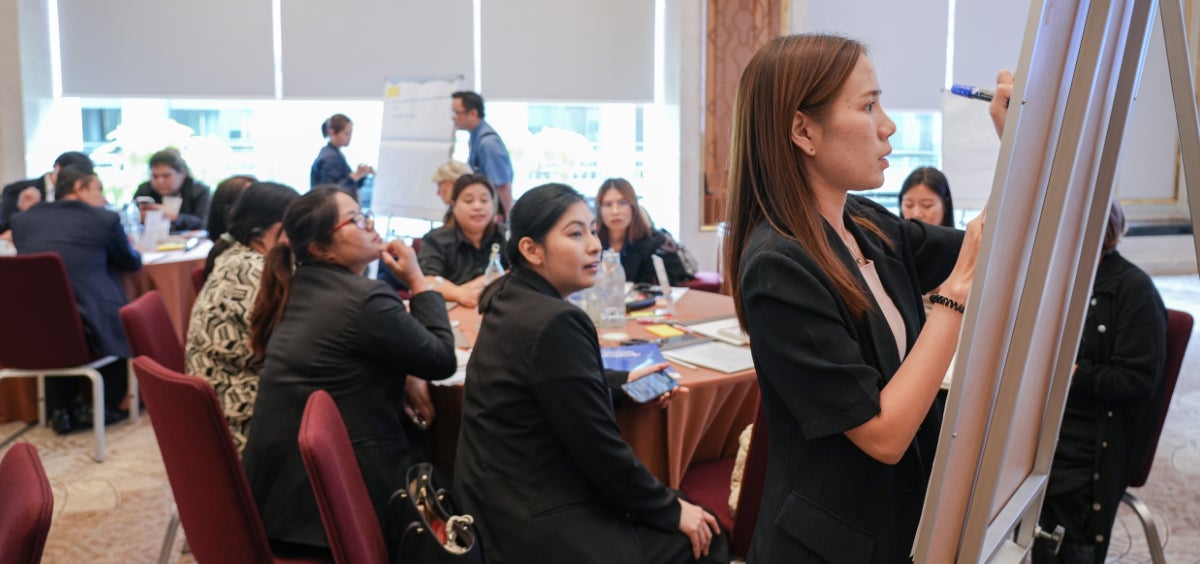Thai government and civil society representatives enhance their skills in responding to violence against women, including migrant workers
Date:

In a significant step toward addressing violence against women and girls (VAWG) in Thailand, UN Women hosted two workshops focused on improving VAWG coordinated responses mechanisms, with a focus on women migrant workers.
Supported by the EU-funded "Protect" Project and the Australian Government’s Department of Foreign Affairs and Trade (DFAT), the workshops brought together frontline service providers, including government and civil society organizations’ (CSOs) personnel to share best practices and discuss lessons learnt in preventing and responding to violence, particularly as it affects women migrant workers.
Women migrant workers in Thailand are among the most vulnerable groups, often facing multiple forms of violence—physical, emotional, and sexual—both in their workplaces and homes. The workshops aimed to strengthen both the knowledge and capacities of frontline service providers by introducing key concepts of coordinated responses to VAWG, ensuring that all women, including migrant women, have access to comprehensive and survivor-centered services.
Jomtien Jansomrag, a Program Officer at Raks Thai Foundation (member of CARE International) who attended the workshop for civil society organizations, said: "Women migrant workers fear that if they report violence to the police, they will be sent back to their country of origin. To follow a survivor-centric approach, we often need to help them secure legal status and employment before pursuing legal action against their abusers."
"This workshop made me realize that no organization can achieve its goals alone. We must work together for shared success. I plan to contribute by offering insights on how to bridge the collaboration gap and improve future efforts," said Rangsima Puangngern, a Social Development Worker at the Department of Women's Affairs and Family Development of the Thai Ministry of Social Development and Human Security, who attended the workshop for government employees.
The workshops also created a platform for service providers to share their experiences in handling cases of domestic violence, workplace harassment, and other forms of gender-based violence. Participants discussed the need for more effective legal frameworks and better training for law enforcement, healthcare providers, and other responders with a focus on coordinated principles.
Another key objective of the workshops was to promote knowledge sharing and to introduce participants to new concepts in VAWG responses. This included a focus on the specific vulnerabilities faced by women migrant workers, who are often isolated from traditional support networks due to their status, language barriers, or the nature of their employment.
"By engaging frontline service providers to define and practice rights-based and truly survivor-centered approaches, we can ensure that every woman facing violence receives the support she deserves, regardless of who she is- including identity, personal history, where she fits in the social structure, disability, nationality or migration status,” said Melissa Alvarado, UN Women’s Regional Programme Manager on Ending Violence against Women for Asia and the Pacific.
“Convening these learning and skill-building sessions go beyond training individuals; they are part of our broader commitment to transforming institutions so they can deliver sustainable, survivor-centered responses to violence. We aim to go beyond immediate interventions to create long-lasting systems of support for those for everyone, including those who are most marginalized. By bringing those at the margins to the center, everyone benefits from better systems," she added.
This workshop was supported by the three-year project "Ensuring Decent Work and Reducing Vulnerabilities for Women and Children in the Context of Labour Migration in Southeast Asia (PROTECT)," running from 2024 to 2026. The project is jointly implemented by the ILO, UN Women, UNICEF, and UNODC to protect the rights of women and children in labor migration. The workshop was also supported by Australia's Department of Foreign Affairs and Trade (DFAT) under a partnership to end violence against women in the Asia-Pacific region.

